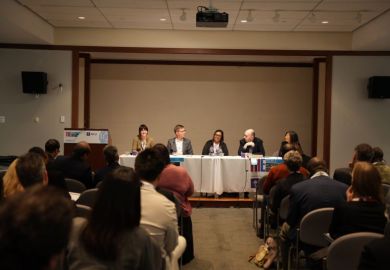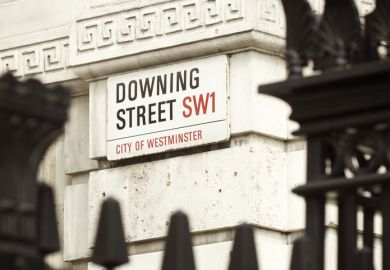Universities must take the initiative on international collaboration issues and not wait for their governments to act, sector leaders have urged.
Speakers at the Times Higher Education Leadership & Management Summit discussed the findings of this year’s THE university leaders survey, which focuses on how institutions are navigating the heightened geopolitical tensions between nations such as Russia and China and the Western bloc.
They discussed how higher education has been dealing with concerns around scientific exchange with China – and the tensions this can cause both between governments and the sector, and within the global higher education system itself.
Recent years have seen Chinese professors in the US investigated over allegations of intellectual property theft, and increased restrictions being placed on collaboration with universities in rival countries.
But the survey of nearly 100 university leaders from across the world found that 81 per cent believe the free exchange of scientific knowledge is still widely regarded as a good thing among the public and politicians.
Chris Hale, director of policy at Universities UK, said research institutions have always had to navigate challenges around restrictions on scientific exchange, but the survey shows that “the world is changing, and political attitudes are changing”.
“A lot of these issues are coming more to the forefront, and I think the onus is on the sector to think proactively on how it engages and manages,” he said.
Government regulation of international collaboration must be proportionate, he added, but the sector had to take its responsibilities seriously and not just use academic freedom as an excuse to do nothing.
“We’ve got to acknowledge the political realities that we’re operating in,” said Mr Hale.
“The onus is on us not to just sit around and wait for government to do something, but to actually take some of that initiative ourselves.”
Also speaking during the session was Sir Anthony Finkelstein, president of City, University of London, and a former chief scientific adviser for national security to the UK government.
“My belief is that universities can only be truly international if they have a proper understanding of what it means to be national,” he said.
“Often the national is missed, and I think it needs to be revisited. If we had a good sense of that, we would be able to be better and much more effective global players.”
Debates have also raged around how much collaboration universities should undertake with overseas bodies that are accused of acting on behalf of their governments – including, in the case of China, Huawei and the Confucius Institutes – sometimes without clear guidance from the state.
“The most effective way – at least for the bulk of collaboration in this area – is through active self-regulation falling within a framework, undertaken in collaboration with those in government,” said Sir Anthony.
“Universities are probably freer to do that than government – I think self-regulation enables something that is more active.”
Sir Anthony also warned that universities might find themselves on the wrong side of covert influence and subversion.
“Confucius Institutes might be a vehicle for that sort of activity, and we should also be worried about where we go with respect to that threat, which actually in the overall swing of things is by far the most serious threat to the UK’s security,” he added.
Register to continue
Why register?
- Registration is free and only takes a moment
- Once registered, you can read 3 articles a month
- Sign up for our newsletter
Subscribe
Or subscribe for unlimited access to:
- Unlimited access to news, views, insights & reviews
- Digital editions
- Digital access to THE’s university and college rankings analysis
Already registered or a current subscriber?








